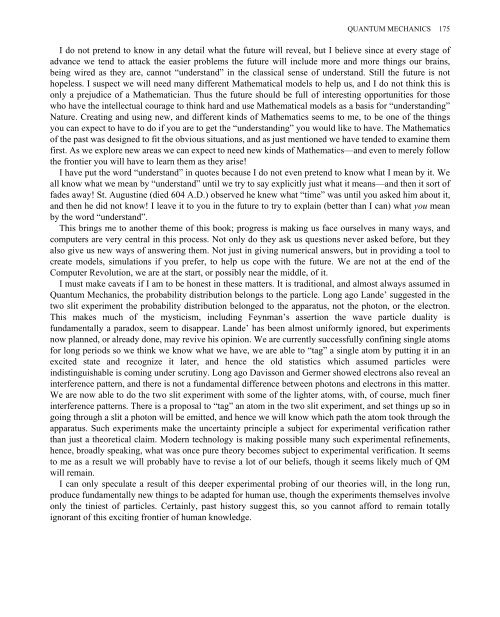hamming
hamming
hamming
Create successful ePaper yourself
Turn your PDF publications into a flip-book with our unique Google optimized e-Paper software.
QUANTUM MECHANICS 175I do not pretend to know in any detail what the future will reveal, but I believe since at every stage ofadvance we tend to attack the easier problems the future will include more and more things our brains,being wired as they are, cannot “understand” in the classical sense of understand. Still the future is nothopeless. I suspect we will need many different Mathematical models to help us, and I do not think this isonly a prejudice of a Mathematician. Thus the future should be full of interesting opportunities for thosewho have the intellectual courage to think hard and use Mathematical models as a basis for “understanding”Nature. Creating and using new, and different kinds of Mathematics seems to me, to be one of the thingsyou can expect to have to do if you are to get the “understanding” you would like to have. The Mathematicsof the past was designed to fit the obvious situations, and as just mentioned we have tended to examine themfirst. As we explore new areas we can expect to need new kinds of Mathematics—and even to merely followthe frontier you will have to learn them as they arise!I have put the word “understand” in quotes because I do not even pretend to know what I mean by it. Weall know what we mean by “understand” until we try to say explicitly just what it means—and then it sort offades away! St. Augustine (died 604 A.D.) observed he knew what “time” was until you asked him about it,and then he did not know! I leave it to you in the future to try to explain (better than I can) what you meanby the word “understand”.This brings me to another theme of this book; progress is making us face ourselves in many ways, andcomputers are very central in this process. Not only do they ask us questions never asked before, but theyalso give us new ways of answering them. Not just in giving numerical answers, but in providing a tool tocreate models, simulations if you prefer, to help us cope with the future. We are not at the end of theComputer Revolution, we are at the start, or possibly near the middle, of it.I must make caveats if I am to be honest in these matters. It is traditional, and almost always assumed inQuantum Mechanics, the probability distribution belongs to the particle. Long ago Lande’ suggested in thetwo slit experiment the probability distribution belonged to the apparatus, not the photon, or the electron.This makes much of the mysticism, including Feynman’s assertion the wave particle duality isfundamentally a paradox, seem to disappear. Lande’ has been almost uniformly ignored, but experimentsnow planned, or already done, may revive his opinion. We are currently successfully confining single atomsfor long periods so we think we know what we have, we are able to “tag” a single atom by putting it in anexcited state and recognize it later, and hence the old statistics which assumed particles wereindistinguishable is coming under scrutiny. Long ago Davisson and Germer showed electrons also reveal aninterference pattern, and there is not a fundamental difference between photons and electrons in this matter.We are now able to do the two slit experiment with some of the lighter atoms, with, of course, much finerinterference patterns. There is a proposal to “tag” an atom in the two slit experiment, and set things up so ingoing through a slit a photon will be emitted, and hence we will know which path the atom took through theapparatus. Such experiments make the uncertainty principle a subject for experimental verification ratherthan just a theoretical claim. Modern technology is making possible many such experimental refinements,hence, broadly speaking, what was once pure theory becomes subject to experimental verification. It seemsto me as a result we will probably have to revise a lot of our beliefs, though it seems likely much of QMwill remain.I can only speculate a result of this deeper experimental probing of our theories will, in the long run,produce fundamentally new things to be adapted for human use, though the experiments themselves involveonly the tiniest of particles. Certainly, past history suggest this, so you cannot afford to remain totallyignorant of this exciting frontier of human knowledge.


